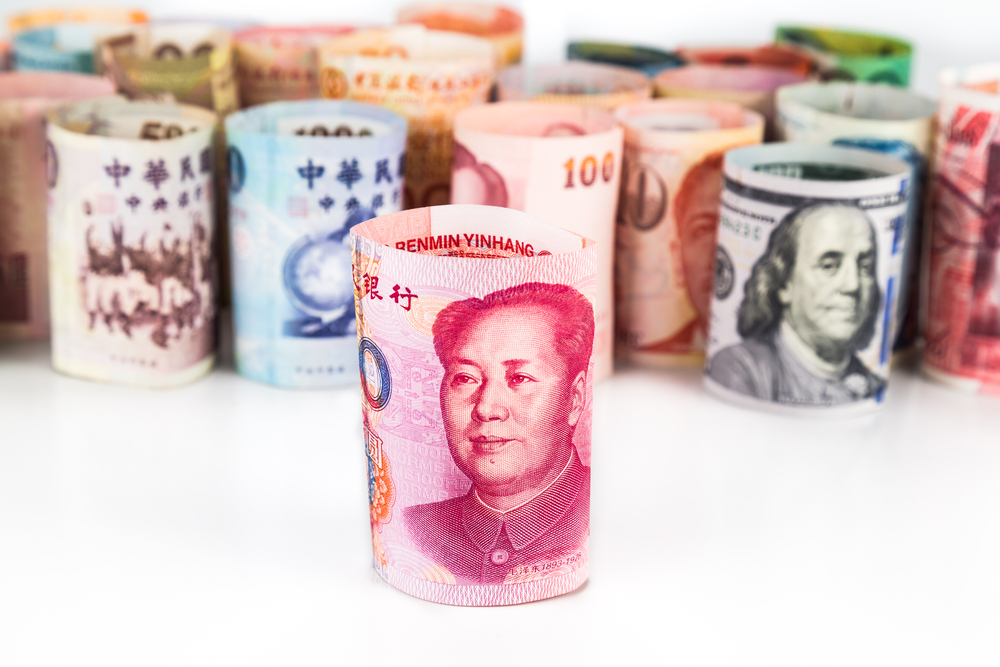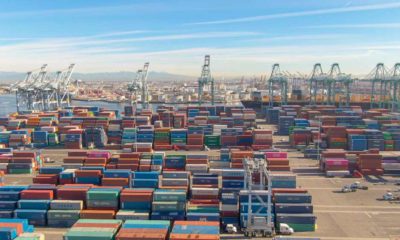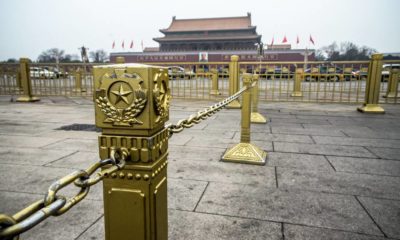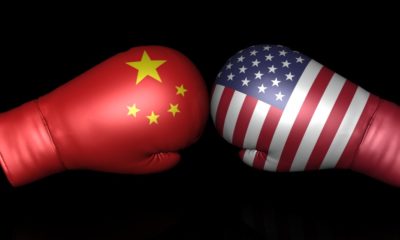Economy
Nations Notice As China Allows Yuan To Lose Value

Exchange-rate strategies in Beijing in regards to the U.S. dollar, as well as thirteen other currencies, are still causing uncertainty and doubt.
The money in China, termed the yuan, has experienced a fall of around 3% against the dollar since the start of 2016.
During this same period, the yuan has fallen about 6% against 13 other currencies from around the world.
The graph below shows this drop:

Chengdu, China
Beijing has somehow allowed the yuan to press against the U.S. dollar during 2016 without causing an uproar of protests from its trading partners.
However, things seem to be changing as of late.
A larger depreciation against a much broader selection of currencies is garnering more and more attention.
This past weekend, there was a two-day meeting where Group of 20 finance chiefs gathered and discussed this recent depreciation of the yuan.
The meeting was held in Chengdu, a southwestern city in China.
During this conference, officials from a few of China’s major trading rivals expressed that they were having concerns due to the decline of the yuan, as seen this year.
The yuan has fallen almost 6% when compared to a group of thirteen separate currencies.
Out of these thirteen, the dollar, euro, and yen are included.
When isolated only to show the yuan against the dollar, there was a 3% drop.
The emergence of a weaker yuan against varying other currencies can cause Chinese exporters to have an advantage over those from different countries in global markets.
Taro Aso, the Japanese Finance Minister, spoke to reporters on Saturday and said that he told the Group of 20 to keep a close eye on the future direction of the yuan, along with the Chinese economy as a whole.
Privately other Western officials mentioned that they had offered advice to China, cautioning them against weakening the yuan broadly.
Both of these remarks illustrate that the exchange rates in China are continuing to be a great source of doubt and uncertainty for both investors and global policy makers.
The yuan has gone through two rounds of devaluations in the past year alone, which has triggered a swell of panic selling in markets all over the world.
This devaluation has also exacerbated the money flow being sent out of China.
The central bank in China has also improved its communication in regards to the mechanism that controls yuan-pricing.
This improvement has helped to ease the doubts and nervousness surrounding the most recent instance of yuan depreciation, which began in late May of this year.
Many of the economists within China have suggested that the yuan should be watched but allowed to continue to weaken while the country sees a slowing economy.
However, the People’s Bank of China has reported that they have had to be careful to monitor this weakening.
By keeping it gradual, they prevent the possibility of it leading to speeding up capital outflows.
The United Kingdom’s decision to leave the European Union on June 23, 2016, has assisted in speeding up the yuan’s descent due to the central bank benefitting from the expanding dollar to devalue the yuan.
[ms_divider style=”normal” align=”left” width=”100%” margin_top=”30″ margin_bottom=”30″ border_size=”5″ border_color=”#f2f2f2″ icon=”” class=”” id=””][/ms_divider]
[ms_featurebox style=”4″ title_font_size=”18″ title_color=”#2b2b2b” icon_circle=”no” icon_size=”46″ title=”Recommended Link” icon=”” alignment=”left” icon_animation_type=”” icon_color=”” icon_background_color=”” icon_border_color=”” icon_border_width=”0″ flip_icon=”none” spinning_icon=”no” icon_image=”” icon_image_width=”0″ icon_image_height=”” link_url=”http://go.chooseyourselfnetwork.com/aff_c?offer_id=25&aff_id=1044&aff_sub=TC 1&aff_sub2=native&aff_sub3=07-30-16″ link_target=”_blank” link_text=”Click Here To Watch The Video” link_color=”#4885bf” content_color=”” content_box_background_color=”” class=”” id=””]
One Man Finally Reveals How To Invest In Silicon Valley Startups Without Having Millions Of Dollars.
This 10 Minute Video Shows You How.
[/ms_featurebox]
[ms_divider style=”normal” align=”left” width=”100%” margin_top=”30″ margin_bottom=”30″ border_size=”5″ border_color=”#f2f2f2″ icon=”” class=”” id=””][/ms_divider]
This led to the yuan weakening 1.6% against the dollar, as well as 1% against the other 13 currencies in the first two weeks after the decision for Britain to exit the EU, a move termed as Brexit.
When the United Kingdom made the choice to secede after a harrowing vote on whether or not to remain in the European Union, it led to many consequences on economies all over the world.
China and the yuan are just one of the many markets and currencies affected.
Last week, the central bank made the decision to keep the yuan mainly stable against the currency basket and guide it higher against the greenback.
This decision came right before the weekend G-20 meeting in Chengdu.
The exchange rate maneuvering in Beijing has been mainly driven by the dollar.
The PBOC focused on anchoring the yuan to the dollar while the greenback was weak, letting the yuan collapse against the basket.
On the opposite end of the spectrum, the PBOC allowed the yuan to weaken when the dollar advanced, leading to the yuan being kept mostly stable against the basket.
In 2016, the dollar has strengthened less than it has reduced, leading to a weaker yuan against the basket than against the dollar.
The graph below shows the China Exchange Rate Pressure from 2000 to 2016.
As one can see, it plummets near the end of 2015:

Chi Lo works as a China economist for BNP Paribas Investment Partners, which is the asset-management arm of the bank based in Paris.
Lo said that he continues to believe that the Chinese central bank only desires stability for the yuan because a continued weakening of the yuan could end up renewing capital outflows.
Analysts from Goldman Sachs Group Inc. say that there was an estimated jump to $49 billion in outflows last month from the $25 billion that occurred in May.
This increase is seen as a result of the decreasing yuan.
Lo also said that the thing they do not know is whether the PBOC desires a stable trade-weighted exchange rate or if they want a stable yuan-dollar rate, which would be measured and determined by the yuan’s value against the basket of currencies, which includes the euro, dollar, and yen.
Larry Hu, a China economist at Macquarie Group LTD., which is an investment bank based in Sydney, said that the combination of the rising depreciation of the yuan and the monthly trade surplus of around $50 billion in 2016 would most likely raise one or more concerns among the trading partners of China.
Due to pressure mounting from the rest of the world, as well as the declines and devaluations that the yuan has experienced and suffered from this year, Mr. Hu says that there is a very limited amount of room for any more yuan depreciation against the currency basket for the remainder of 2016.
As you can see below, China hit an unusually high trade surplus at the beginning of 2016 and the end of 2015, though the economy has been slowing for the majority of this year.

After the Group of 20 meeting that concluded on Sunday, which was led by China, the group reaffirmed its pledge to refrain from engaging in beggar-thy-neighbor devaluations.
A public statement by PBOC Governor Zhou Xiaochuan stated that the exchange rate of the yuan against the currency basket is stable and being kept that way.
This, he said, has led to an increased strengthening of the market confidence around the Chinese currency.
Another notable event occurred when a senior United States Treasury official made note of the fact that Beijing has recently intervened to prevent the yuan from seeing any further falls or decreases.
The United States welcomed this action and described it as not being the type of intervention that the U.S. would interpret as being designed to obtain an unfair or unwelcome advantage.
However, it is not to say that Washington has concluded in its attempts to push Beijing into continuing its exchange-rate reform.
The Treasury official remarked that because Beijing does not have full transparency on their intervention, it is challenging and difficult to have 100% confidence in them.
The graph below shows the consequences that Brexit, Britain’s exit from the EU, has caused within currencies around the globe, in particular, the yuan.
This could lead to exporting risks with the overseas sales, as well as a concern regarding the capital outflows.

Conclusion
– Since the start of 2016, currency in China has seen a fall when compared to both the dollar and a basket of around thirteen other currencies.
– Brexit has created an uproar in global markets and currencies everywhere. With a falling euro and economic upheaval all over Europe, it’s no wonder that Asia is suffering too due to the surging dollar.
– China has elected to attempt to control the yuan’s depreciation by keeping a close eye on the value to ease uncertainty from trade investors, as well as renewing capital outflows.
– After meeting over the past weekend in Chengdu, the G-20 came to the decision to refrain from any behavior that could fall under beggar-thy-neighbor devaluations.
– The United States Treasury seems to approve of China’s decision regarding their economy and actions following the depreciation of the yuan, though they warn that there is still not complete confidence in Beijing’s exchange rate program due to the lack of transparency.
– Some have cautioned China against trying to control the yuan and instead advise them to maintain stability while paying attention to the concerns coming from across the world.















